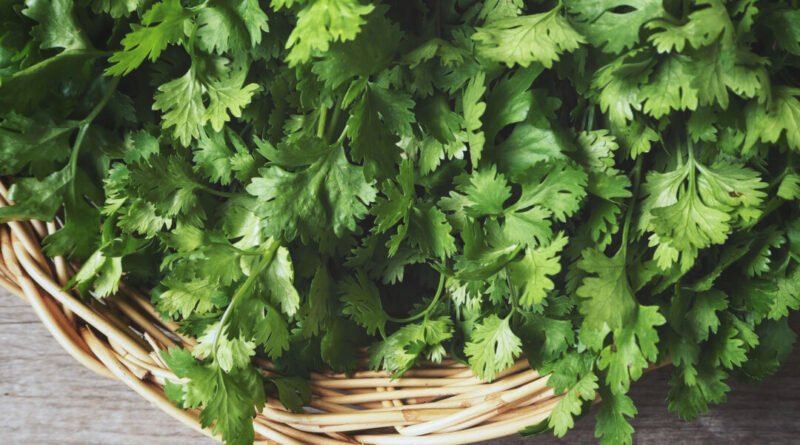Cilantro: Harnessing its Chelation Powers for Anticonvulsant Benefits
In addition to its health benefits, cilantro is a versatile herb and a delicious addition to dishes from soups and salads to guacamole.
Cilantro is a popular herb used in cuisines worldwide for its bright, citrusy flavor, embellishing dishes from Mexican guacamole and Thai curries to Vietnamese soup (pho). But unbeknownst to some, cilantro is also a powerful medicine—known for its ability to cleanse the body of heavy metals and delay the onset of seizures.
Nutrition
Cilantro and coriander are sometimes confused but come from the same plant–Coriandrum sativum. Cilantro comprises the leaves and stems, whereas coriander refers to the seeds.
In addition to being delicious, cilantro contains abundant phytonutrients and plentiful vitamins K, A, and C. It is a potent antioxidant with antiseptic, antibacterial, antifungal, and anti-inflammatory properties. It also contains minerals like folate, potassium, magnesium, and manganese.
Coriander seeds are also used medicinally, have abundant vitamin C, and have antioxidant, antibacterial, antiviral, antifungal, antimicrobial, and antiseptic properties.
Other names for cilantro include Chinese and Mexican parsley, and it is called coriander in the UK.
Traditional medicines are well aware of cilantro’s healing properties, and the leaves and stems treat various conditions, including digestive upsets, promoting healthy sleep, managing anxiety, balancing blood sugar levels, and detoxifying the body.

A Natural Chelator
The most notable benefit of cilantro is its powerful ability to cleanse the body of toxic heavy metals, which it does through chelation.
Heavy metals include (but are not limited to) mercury, lead, cadmium, aluminum, and arsenic.
- Eating contaminated food
- Drinking contaminated water
- Inhaling them from the atmosphere
- Absorbing them through contact with the skin
Heavy metals can accumulate in the tissues, blood, bones, and organs, like the liver, kidneys, and brain, where they can lead to complications from disorders of the nervous and immune system to cancer.
A sea of toxins bombards us daily, and natural chelators help us regularly detoxify from these harmful heavy metals so they don’t accumulate and make us sick.
Cilantro binds to heavy metals in our bodies and transports them out via the excretory system.
Cilantro Chelation Studies
Studies in mice and humans have demonstrated cilantro’s chelating prowess.
Cilantro also increased the excretion (via urine) of delta-aminolevulinic acid—which the study states is known to increase after lead consumption. These levels drastically decreased after the animals had cilantro. Based on their results, the researchers concluded that cilantro suppresses lead’s ability to be stored in the body.
In the mid-1990s, Dr. Yoshiaki Omura, then director of medical research at the Heart Research Foundation, made a compelling discovery. After he and his colleagues had little success treating infections in their patients with antibiotics and antivirals, Dr. Omura found that these patients had localized concentrations of metals such as lead, mercury, and aluminum. While testing one patient, he noticed a significant increase in mercury levels in the patient’s urine after he had eaten Vietnamese soup—which contains fresh cilantro.
After further testing, Dr. Omura found that eating cilantro (or drinking cilantro juice) expedited the removal of aluminum and lead in the body. When he advised his patients to consume fresh cilantro or its juice and then use antibiotics or natural antivirals, their infections would heal permanently.
Dr. Omura subsequently conducted two studies based on his observations.
Cilantro as an Anticonvulsant
In addition to being a powerful chelator, cilantro is an anticonvulsant and can slow or delay the onset of seizures associated with epilepsy and other disorders.
A study published in 2019 found out why.
Other Conditions Treated
Cilantro and its seeds are used to treat many conditions, some of which are listed below.
Final Thoughts
Despite how hard we try to avoid them, heavy metals and other toxins are ubiquitous in our air, soil, water, and food. Eating foods like cilantro, garlic, onions, and Brazil nuts and using other natural chelators, like chlorella and activated charcoal, helps us regularly cleanse the toxins we inevitably accumulate from daily living.
If you are considering using cilantro for a major detox and want to use levels higher than those naturally found in foods, be sure to do so under the supervision of a health care provider to ensure you are doing it safely and have professional support.
Cilantro is a versatile herb that makes a delicious addition to many dishes—it creates a tasty pesto, makes an excellent sauce, and pairs exceptionally well with lime (yum!). It can be grown in a backyard garden or apartment balcony, giving your dishes a splash of flavor and your body a mountain of health benefits. For those who are not fans of its flavor but still want to reap the benefits, it is available in supplement form.






